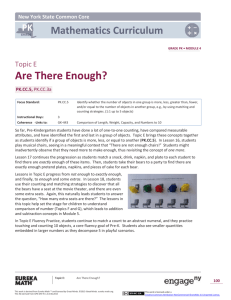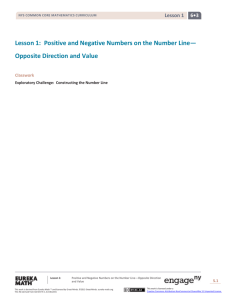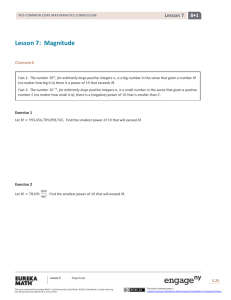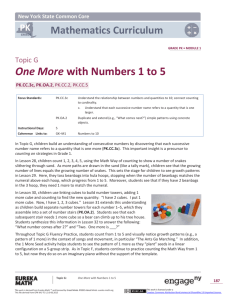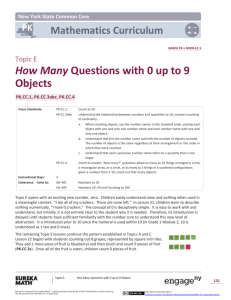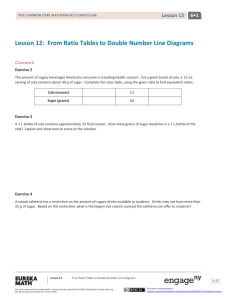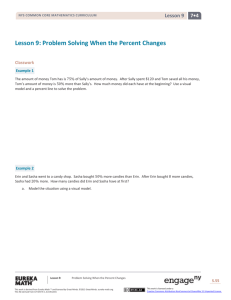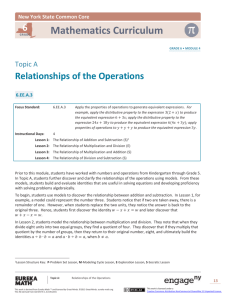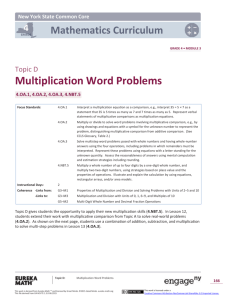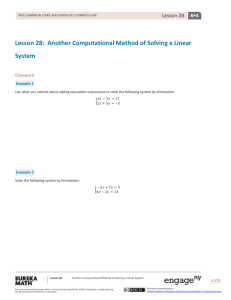End-of-Module Assessment Task
advertisement
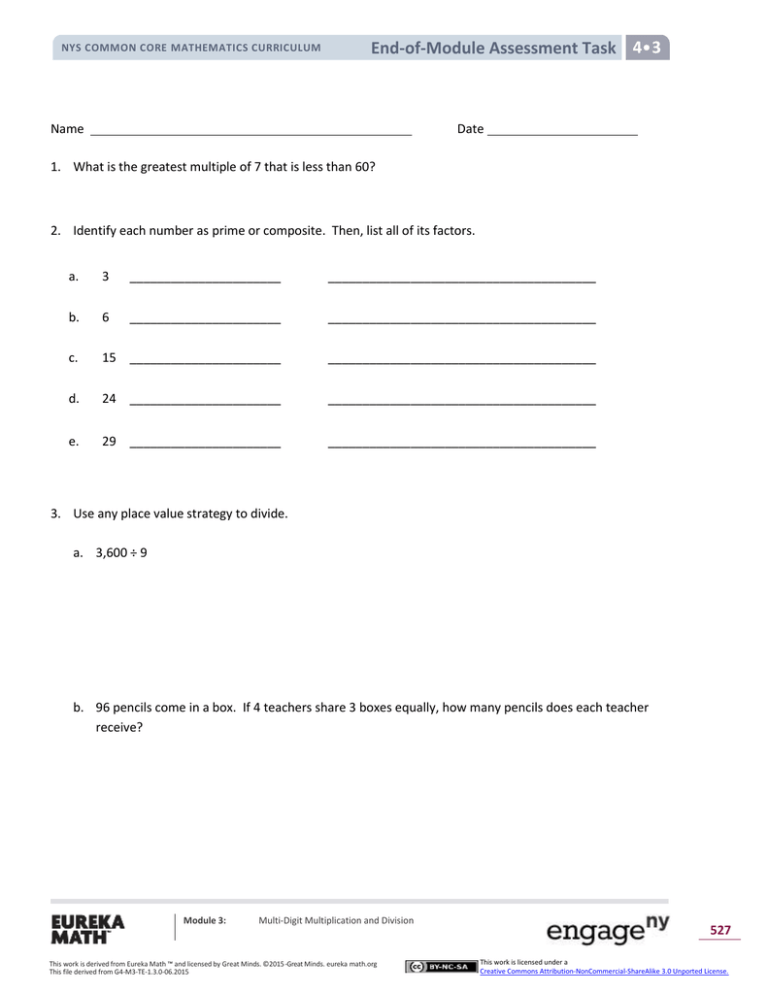
NYS COMMON CORE MATHEMATICS CURRICULUM 4 3 End-of-Module Assessment Task Lesson 2 Name Date 1. What is the greatest multiple of 7 that is less than 60? 2. Identify each number as prime or composite. Then, list all of its factors. a. 3 ______________________ _______________________________________ b. 6 ______________________ _______________________________________ c. 15 ______________________ _______________________________________ d. 24 ______________________ _______________________________________ e. 29 ______________________ _______________________________________ 3. Use any place value strategy to divide. a. 3,600 ÷ 9 b. 96 pencils come in a box. If 4 teachers share 3 boxes equally, how many pencils does each teacher receive? Module 3: Multi-Digit Multiplication and Division This work is derived from Eureka Math ™ and licensed by Great Minds. ©2015 -Great Minds. eureka math.org This file derived from G4-M3-TE-1.3.0-06.2015 527 This work is licensed under a Creative Commons Attribution-NonCommercial-ShareAlike 3.0 Unported License. NYS COMMON CORE MATHEMATICS CURRICULUM 4 End-of-Module Assessment Task Lesson 2 4. 427 ÷ 3 a. Solve by drawing place value disks. b. Solve numerically. 5. Use any place value strategy to multiply or divide. b. 3,809 ÷ 5 a. 5,316 ÷ 3 d. 17 × 43 c. 29 × 56 Module 3: Multi-Digit Multiplication and Division This work is derived from Eureka Math ™ and licensed by Great Minds. ©2015 -Great Minds. eureka math.org This file derived from G4-M3-TE-1.3.0-06.2015 528 This work is licensed under a Creative Commons Attribution-NonCommercial-ShareAlike 3.0 Unported License. NYS COMMON CORE MATHEMATICS CURRICULUM 4 End-of-Module Assessment Task Lesson 2 Solve using a model or equation. Show your work, and write your answer as a statement. 6. A new grocery store is opening next week. a. The store’s rectangular floor is 42 meters long and 39 meters wide. How many square meters of flooring do they need? Use estimation to assess the reasonableness of your answer. b. The store ordered small posters and large posters to promote their opening. 12 times as many small posters were ordered as large posters. If there were 48 large posters, how many more small posters were ordered than large posters? Module 3: Multi-Digit Multiplication and Division This work is derived from Eureka Math ™ and licensed by Great Minds. ©2015 -Great Minds. eureka math.org This file derived from G4-M3-TE-1.3.0-06.2015 529 This work is licensed under a Creative Commons Attribution-NonCommercial-ShareAlike 3.0 Unported License. NYS COMMON CORE MATHEMATICS CURRICULUM End-of-Module Assessment Task Lesson New York State Common Core c. Uniforms are sold in packages of 8. The store’s 127 employees will each be given 3 uniforms. How many packages will the store need to order? d. There are three numbers for the combination to the store’s safe. The first number is 17. The other two numbers can be multiplied together to give a product of 28. What are all of the possibilities for the other two numbers? Write your answers as multiplication equations, and then write all of the possible combinations to the safe. Module 3: Multi-Digit Multiplication and Division This work is derived from Eureka Math ™ and licensed by Great Minds. ©2015 -Great Minds. eureka math.org This file derived from G4-M3-TE-1.3.0-06.2015 530 This work is licensed under a Creative Commons Attribution-NonCommercial-ShareAlike 3.0 Unported License. NYS COMMON CORE MATHEMATICS CURRICULUM End-of-Module Assessment Task Lesson New York State Common Core End-of-Module Assessment Task Standards Addressed Topics A–H Use the four operations with whole numbers to solve problems. 4.OA.1 Interpret a multiplication equation as a comparison, e.g., interpret 35 = 5 × 7 as a statement that 35 is 5 times as many as 7 and 7 times as many as 5. Represent verbal statements of multiplicative comparisons as multiplication equations. 4.OA.2 Multiply or divide to solve word problems involving multiplicative comparison, e.g., by using drawings and equations with a symbol for the unknown number to represent the problem, distinguishing multiplicative comparison from additive comparison. 4.OA.3 Solve multistep word problems posed with whole numbers and having whole-number answers using the four operations, including problems in which remainders must be interpreted. Represent these problems using equations with a letter standing for the unknown quantity. Assess the reasonableness of answers using mental computation and estimation strategies including rounding. Gain familiarity with factors and multiples. 4.OA.4 Find all factor pairs for a whole number in the range 1–100. Recognize that a whole number is a multiple of each of its factors. Determine whether a given whole number in the range 1–100 is a multiple of a given one-digit number. Determine whether a given whole number in the range 1–100 is prime or composite. Use place value understanding and properties of operations to perform multi-digit arithmetic. 4.NBT.5 Multiply a whole number of up to four digits by a one-digit whole number, and multiply two two-digit numbers, using strategies based on place value and the properties of operations. Illustrate and explain the calculation by using equations, rectangular arrays, and/or area models. 4.NBT.6 Find whole-number quotients and remainders with up to four-digit dividends and onedigit divisors, using strategies based on place value, the properties of operations, and/or the relationship between multiplication and division. Illustrate and explain the calculation by using equations, rectangular arrays, and/or area models. Solve problems involving measurement and conversion of measurements from a larger unit to a smaller unit. 4.MD.3 Apply the area and perimeter formulas for rectangles in real world and mathematical problems. For example, find the width of a rectangular room given the area of the flooring and the length, by viewing the area formula as a multiplication equation with an unknown factor. Module 3: Multi-Digit Multiplication and Division This work is derived from Eureka Math ™ and licensed by Great Minds. ©2015 -Great Minds. eureka math.org This file derived from G4-M3-TE-1.3.0-06.2015 531 This work is licensed under a Creative Commons Attribution-NonCommercial-ShareAlike 3.0 Unported License. NYS COMMON CORE MATHEMATICS CURRICULUM 4 End-of-Module Assessment Task Lesson 2 Evaluating Student Learning Outcomes A Progression Toward Mastery is provided to describe steps that illuminate the gradually increasing understandings that students develop on their way to proficiency. In this chart, this progress is presented from left (Step 1) to right (Step 4). The learning goal for students is to achieve Step 4 mastery. These steps are meant to help teachers and students identify and celebrate what the students CAN do now and what they need to work on next. A Progression Toward Mastery Assessment Task Item 1 4.OA.4 2 4.OA.4 STEP 1 Little evidence of reasoning without a correct answer. STEP 2 Evidence of some reasoning without a correct answer. STEP 3 Evidence of some reasoning with a correct answer or evidence of solid reasoning with an incorrect answer. (3 Points) STEP 4 Evidence of solid reasoning with a correct answer. (1 Point) (2 Points) The student answers incorrectly with a number that is not a multiple of 7. The student answers incorrectly with a number that is a multiple of 7 but greater than 60. The student answers with a multiple of 7 that is less than 60 but not 56. The student correctly answers: The greatest multiple of 7 that is less than 60 is 56. The student is unable to complete the majority of Parts (a)– (e). The student correctly answers prime or composite for three parts and misses more than a total of three factors. The student correctly answers prime or composite for four of the five parts and misses three or fewer factors. The student correctly answers: (4 Points) a. Prime; 1, 3 b. Composite; 1, 2, 3, 6 c. Composite; 1, 3, 5, 15 d. Composite; 1, 2, 3, 4, 6, 8, 12, 24 e. Prime; 1, 29 Module 3: Multi-Digit Multiplication and Division This work is derived from Eureka Math ™ and licensed by Great Minds. ©2015 -Great Minds. eureka math.org This file derived from G4-M3-TE-1.3.0-06.2015 532 This work is licensed under a Creative Commons Attribution-NonCommercial-ShareAlike 3.0 Unported License. NYS COMMON CORE MATHEMATICS CURRICULUM End-of-Module Assessment Task Lesson New York State Common Core A Progression Toward Mastery 3 4.OA.3 4.NBT.5 4.NBT.6 4 4.NBT.6 5 4.NBT.6 6 4.MD.3 4.OA.1 4.OA.2 4.OA.3 4.NBT.5 4.NBT.6 The student incorrectly answers both parts and shows no reasoning. The student correctly answers one part and shows little reasoning. The student answers one part correctly but shows solid reasoning in both problems, or the student shows some reasoning with correct answers for both parts. The student correctly answers using any place value strategy: a. 400 b. Each teacher received 72 pencils. The student incorrectly represents division using place value disks and incorrectly solves numerically. The student incorrectly solves the numeric equation but shows some understanding of the place value chart and use of the algorithm. The student decomposes incorrectly in one place value or does not include the remainder. The student correctly decomposes and divides using the place value disks and provides a numerical answer of 142 with a remainder of 1. The student answers fewer than two parts correctly, showing little to no evidence of place value strategies. The student correctly solves two parts, showing little evidence of place value strategies. The student correctly solves three parts with understanding of place value strategies, or the student correctly solves all four parts but does not show solid evidence of place value understanding. The student solves all parts correctly using any place value strategy: The student incorrectly answers two or more of the four parts, showing little to no reasoning. Module 3: The student correctly answers two of four parts, showing some reasoning. Multi-Digit Multiplication and Division This work is derived from Eureka Math ™ and licensed by Great Minds. ©2015 -Great Minds. eureka math.org This file derived from G4-M3-TE-1.3.0-06.2015 The student answers all four parts correctly but shows little reasoning in Part (a), or the student answers three of four parts correctly showing solid reasoning and understanding mathematically. a. 1,772 b. 761 with a remainder of 4 c. 1,624 d. 731 The student correctly answers all four parts, showing solid evidence of place value understanding: a. 1,638 square meters of flooring (estimate 40 × 40 = 1,600 square m). It is a reasonable because the answer and estimate have a difference of only 38 square meters. b. 528 more small posters than large posters. 533 This work is licensed under a Creative Commons Attribution-NonCommercial-ShareAlike 3.0 Unported License. NYS COMMON CORE MATHEMATICS CURRICULUM End-of-Module Assessment Task Lesson New York State Common Core A Progression Toward Mastery c. 48 packages. d. Equations of 1 × 28 = 28 28 × 1 = 28 2 × 14 = 28 14 × 2 = 28 4 × 7 = 28 7 × 4 = 28 Combinations of 17, 1, 28 17, 28, 1 17, 2, 14 17, 14, 2 17, 4, 7 17, 7, 4 Module 3: Multi-Digit Multiplication and Division This work is derived from Eureka Math ™ and licensed by Great Minds. ©2015 -Great Minds. eureka math.org This file derived from G4-M3-TE-1.3.0-06.2015 534 This work is licensed under a Creative Commons Attribution-NonCommercial-ShareAlike 3.0 Unported License. NYS COMMON CORE MATHEMATICS CURRICULUM Module 3: 4 End-of-Module Assessment Task Lesson 2 Multi-Digit Multiplication and Division This work is derived from Eureka Math ™ and licensed by Great Minds. ©2015 -Great Minds. eureka math.org This file derived from G4-M3-TE-1.3.0-06.2015 535 This work is licensed under a Creative Commons Attribution-NonCommercial-ShareAlike 3.0 Unported License. NYS COMMON CORE MATHEMATICS CURRICULUM End-of-Module Assessment Task Lesson New York State Common Core Module 3: Multi-Digit Multiplication and Division This work is derived from Eureka Math ™ and licensed by Great Minds. ©2015 -Great Minds. eureka math.org This file derived from G4-M3-TE-1.3.0-06.2015 536 This work is licensed under a Creative Commons Attribution-NonCommercial-ShareAlike 3.0 Unported License. NYS COMMON CORE MATHEMATICS CURRICULUM End-of-Module Assessment Task Lesson New York State Common Core Module 3: Multi-Digit Multiplication and Division This work is derived from Eureka Math ™ and licensed by Great Minds. ©2015 -Great Minds. eureka math.org This file derived from G4-M3-TE-1.3.0-06.2015 537 This work is licensed under a Creative Commons Attribution-NonCommercial-ShareAlike 3.0 Unported License. NYS COMMON CORE MATHEMATICS CURRICULUM End-of-Module Assessment Task Lesson New York State Common Core Module 3: Multi-Digit Multiplication and Division This work is derived from Eureka Math ™ and licensed by Great Minds. ©2015 -Great Minds. eureka math.org This file derived from G4-M3-TE-1.3.0-06.2015 538 This work is licensed under a Creative Commons Attribution-NonCommercial-ShareAlike 3.0 Unported License.
